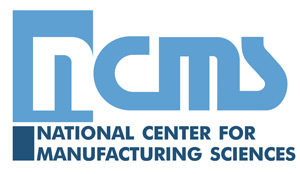Congratulations Rebecca! NCMS Senior Vice President Receives STEP Ahead Award
We won’t lie: frigid weather and mountains of snow aren’t really compatible with our cheery outlook; but good news came to the rescue at just the right time to warm us up. Our very own – and very deserving – Senior VP Rebecca Taylor will receive a 2014 STEP Ahead Award, which celebrates the role of women in manufacturing. It’s part of the Washington, D.C.-based Manufacturing Institute’s Science, Technology, Engineering, and Production (STEP) Initiative. Rebecca will join a select group of women whose outstanding contributions to manufacturing promote women in industry.
 For Rebecca, manufacturing has been both a career and a passion from a young age. She remembers growing up in a manufacturing household: “That fueled my love of making things. On top of that, our mother was really committed to building opportunities for us, and making sure that opportunities were equal – she didn’t care what the ‘traditional’ gender roles said, she wanted her children happy. She also worked hard to teach us to value our passions. What those passions were mattered less to her, I think, than that we held onto them.”
For Rebecca, manufacturing has been both a career and a passion from a young age. She remembers growing up in a manufacturing household: “That fueled my love of making things. On top of that, our mother was really committed to building opportunities for us, and making sure that opportunities were equal – she didn’t care what the ‘traditional’ gender roles said, she wanted her children happy. She also worked hard to teach us to value our passions. What those passions were mattered less to her, I think, than that we held onto them.”
Most people have a set of mental images they associate with the word manufacturing – factories, assembly lines, smokestacks, men with lunchboxes. Rebecca has always seen it somewhat differently, an outlook that fits in well with NCMS and has informed her own career. “Manufacturing is an idea to most people,” she said, “whereas to me it’s always been a more tangible thing. This goes back once again to childhood, really. Growing up in a manufacturing part of the country, with a father who worked in it for most of his career, which shaped my view of what it is and what it does.”
The STEP Ahead awards are intended to promote awareness of what women have contributed to manufacturing already, and to encourage more young women to consider manufacturing as a viable career path. Overall, the ratio of women in manufacturing is increasing – but it’s still a rather dismal 24%. Compare that to the 50/50 parity of women to men elsewhere in the American workforce and it’s clear there’s a lot of room for improvement.
“Part of the reason this award means so much to me is that it’s not just celebrating women in manufacturing, but the idea of more women in manufacturing,” said Rebecca. “Young people can benefit from leadership, mentorship, professional guidance and development, and I consider providing what I can as part of my job.” Her mentorship activities include participation in the International Women’s Forum and direct support for upcoming women in the manufacturing and related professions.
Rebecca liaises with government, business, and academia, representing NCMS interests by building bridges between these sectors, establishing the roots of collaboration and creating common language in realms where the representatives often have difficulty understanding one another. “It’s creative problem solving,” she said. “The key is to remember that the languages spoken are often quite different. Manufacturing speaks a different language than U.S. Policy. Neither speaks the same language as Universities. Getting them all to work together effectively becomes much easier when everyone is communicating. So you get a collaborative opportunity, identify who’s involved, and figure out how to build communication and trust. That’s what NCMS does, essentially. It assembles solutions from many pieces, and those solutions go on to attack problems.”
Manufacturing, too, solves problems – which can be huge and broad or very personal, something Rebecca has had recent experience with. “I have this 1994 Corvette convertible, it’s gorgeous,”  Rebecca said. “Living in D.C., the weather doesn’t always cooperate, but driving with the top down when the cherry blossoms are out, there’s nothing better in the world. So a few summers ago, something broke. Not something important. It was this fixture that secures the engine computer. I thought it would be an easy fix, until I actually started looking for a replacement part. Nobody stocked it. Not vintage auto places, not dealers, I checked online auctions and came up with nothing. We’re talking about something that’s basically a glorified tray, something that probably costs less than twenty bucks, and not only has it crippled my Vette, it might be what kills it.”
Rebecca said. “Living in D.C., the weather doesn’t always cooperate, but driving with the top down when the cherry blossoms are out, there’s nothing better in the world. So a few summers ago, something broke. Not something important. It was this fixture that secures the engine computer. I thought it would be an easy fix, until I actually started looking for a replacement part. Nobody stocked it. Not vintage auto places, not dealers, I checked online auctions and came up with nothing. We’re talking about something that’s basically a glorified tray, something that probably costs less than twenty bucks, and not only has it crippled my Vette, it might be what kills it.”
Characteristically, Rebecca applied her views on collaboration and the power of manufacturing to her tray-bereft car. She wrote a call for help on Digital Manufacturing Report, an online magazine and NCMS media partner. The responses ranged from sympathies to purchase offers, but eventually the solution materialized – or, rather, grew via additive process. Stratasys, Inc. builds 3D printers that build functional prototypes and production parts layer by layer using industrial thermoplastics. The company redesigned the tray’s CAD model and fed the result to a Fortus 400mc. The result?
“I got top-down cherry blossom season,” laughs Rebecca. “I love that story because it tells us something about the future of manufacturing. I couldn’t get a replacement tray because it was out of production. Most options were only cost effective at high volume. But manufacturing doesn’t stand still; additive is one of the next big things, and it might change everything about how parts are produced.”
There’s also the point that today’s manufacturing jobs have more to do with Corvettes and CAD than with old-school perceptions. The STEP Ahead award recognizes Rebecca’s career-long efforts to build awareness of this reality among young people considering careers in engineering or industry.
“Go into a kindergarten classroom and ask those kids how many can draw, or build with clay,” Rebecca said. “Every one of them will raise their hand. Then ask the same of a high school class, and I guarantee you’ll see just a few hands go up. Kids imagine and build with Legos or draw with crayons and they don’t care if it’s architecturally sound or if the perspective is right. It’s wondrous to build something out of parts. But somewhere along the line they get told they’re doing it wrong, and that passion for creating goes away. All young children can draw because nobody’s told them they can’t. We need to find ways to encourage those skills, not deny them. Manufacturing is beautiful because it is an act of creation, it’s an act of problem solving, and it’s something that young people – young women especially – should see as enticing. Manufacturers are the ones who never gave up on their Legos, but moved beyond them.”
The Manufacturing Institute will present Rebecca and the other 2014 honorees with their STEP Ahead awards at an event in Washington, D.C. on February 6.
